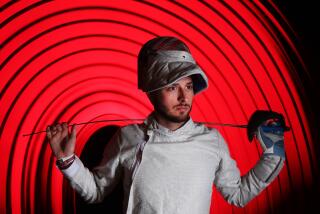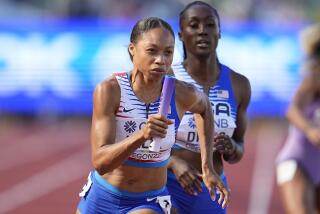Three-Time Olympian Kennedy Hoping for Successful Return
- Share via
LAKE PLACID, N.Y. — He tilted his shiny new red sled on its side, gave the runners a once-over with an icy stare, and meticulously finished his taping job, strip by black strip.
Then Duncan Kennedy, the most successful singles luge racer in U.S. history, smiled and pondered his return to the sport two years after he was forced to retire for health reasons.
“I’m real excited,” the three-time Olympian said. “I’ve had the most odd career because I’ve had a lot of ups, but I’ve had a whole lot of downs. The driving force behind this is that I love to luge and I love to compete.”
Kennedy’s long career came to a sudden halt when he was felled by bouts of dizziness and nausea during training camp in Nagano, Japan, less than two months before the start of the 1998 Winter Olympics.
When the headaches didn’t go away, doctors told Kennedy to quit because of a condition he was born with, arteriovenous malformation, occasional slight bleeding from the stem of the brain.
It was nothing new for Kennedy. He had his first such episode in 1981 at age 14.
“Even before I started sliding, I would be sitting in a room and all of a sudden it would feel like the room was in a constant back flip. I was so dizzy I couldn’t even sit,” he said.
“When the symptoms were severe, I couldn’t distinguish between dreaming and being awake. I’d go to my house or hotel or wherever I was staying and I’d have to stop and double-check to make sure I was actually where I thought I was. It really got kind of frightening.”
In the last two years, his condition has improved and doctors told him he could compete again. Those who know him best remain cautiously optimistic.
“For his health and safety, I’m still a little bit concerned for him,” said Ron Rossi, a former teammate and now director of USA Luge. “I know he’s been smart about this, and if he starts having recurring symptoms I’m expecting him to say, ‘No, it was worth the try, but I’ve got to get out.’ I just hope he’s not foolish about it.”
Kennedy has won 21 World Cup medals in his career, which began in 1980, and he was the racer most expected to get that first Olympic medal in the sport for the United States.
He also gained international acclaim in 1993 when he saved black teammate Robert Pipkins from a gang of neo-Nazi skinheads in the town of Oberhof in the former East Germany. Kennedy was severely beaten in the attack.
At the 1994 Games in Lillehammer, Norway, Kennedy was progressing toward a top-three performance when he crashed on the third of four heats and was eliminated.
It was not the way he wanted his career to end. After the low point of not being able to compete in Nagano, Kennedy raced on the eastern snowboard circuit, coached luge part-time and slid recreationally.
That’s when he dared to dream again.
“I started to think about returning last winter as the symptoms were clearing and thought more about it this spring,” he said.
When he set his personal best times on the Lake Placid luge track, the edge was back.
“I thought maybe I could do this again I felt so good on the sled,” he said. “I checked with my doctor, and he said, ‘Go to it.’ I know I still have it. I want to show everybody that I do.”
Kennedy hit the ice last week in Park City, Utah, to practice on a track where sled speeds surpass 80 mph. Barring more medical problems, he was a shoe-in to make the U.S. World Cup team.
Still, it promised to be a challenge unlike any other in sports.
“I always have slight symptoms,” said Kennedy, who knows he faces an operation if he has another severe attack. “Even right now, my head isn’t quite there, but it doesn’t affect anything. I set a lot of personal bests in my physical training this summer. It was a great summer. I haven’t changed a thing.”
Except his age. He will be 32 in December, but that shouldn’t be a problem. His two favorite rivals have him beat there: Eight-time World Cup champion Markus Prock of Austria is 35 and three-time Olympic champion Georg Hackl of Germany is 33.
“They’re both incredible sliders,” said Kennedy, who has his eyes on the 2002 Winter Games in Salt Lake. “I respect them both. There were several years where it was just pretty much the three of us on the podium all the time. I hope I’m able to get up there and be with them again.
“Some people might think it’s a glory days-type thing, but I think it’s where I belong. I just have to remember to have fun sliding and not put too much pressure on myself.”
More to Read
Go beyond the scoreboard
Get the latest on L.A.'s teams in the daily Sports Report newsletter.
You may occasionally receive promotional content from the Los Angeles Times.







